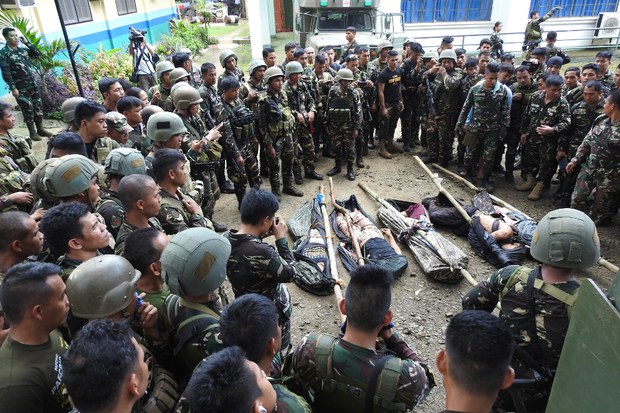Abu Sayyaf Kills 4 Civilians in Attacks: Philippine Military
2018.02.02
Cotabato City, Philippines
 Philippine soldiers look at bodies of suspected Abu Sayyaf militants who were killed during an encounter with government forces in Jolo, Sept. 7, 2017.
Philippine soldiers look at bodies of suspected Abu Sayyaf militants who were killed during an encounter with government forces in Jolo, Sept. 7, 2017.
Abu Sayyaf militants killed four civilians, including two government workers, in separate attacks this week in the southern Philippines, where the military has intensified operations, officials said Friday.
An undetermined number of Abu Sayyaf Group (ASG) members ambushed a private vehicle in Patikul, a town on Jolo island, killing two people and injuring four others on Thursday, said Brig. Gen. Cirilito Sobejana, commander of a local military task force.
The dead were identified as Muksin Kaidin and his brother, Mukim, while the other four civilians were said to be in critical condition. Abu Sayyaf had tagged the slain brothers as “informants.”
“They are not military informants,” Sobejana said. “It could have been a case of a clan feud, but there is an ongoing operation against the militants.”
Deadly inter-clan conflicts are common in the southern Philippines, and Abu Sayyaf is known to participate in attacks if a member’s relative is involved in such feuds.
On Wednesday, Abu Sayyaf militants attacked and killed two government workers and injured two others in Lamitan, a township on Basilan, another island in the far south.
Supt. Christopher Panapan, the local police chief, identified the slain men as Basit Daimun and Ahzhar Dakis, who were both road construction workers employed by the government’s public works bureau.
The men were on a truck en route to Lamitan, when the Abu Sayyaf men flagged down their vehicle and attacked them. Two others on board the truck were badly injured but survived, Panapan said.
Solar Undug, the local head of the public works bureau, said the Abu Sayyaf had earlier threatened workers if they failed to fork over “protection money.”
Founded in the early 1990s by an Afghan-trained militant, ASG is notorious for kidnappings, bombings and random attacks in the southern Philippine region of Mindanao.
In the past two years, ASG beheaded two Canadian hostages and a German captive after their governments refused to pay ransom money. The group is believed to still be holding several foreigners and Filipinos hostage.
In October, the military killed Isnilon Hapilon, an Abu Sayyaf leader who considered the head of the Islamic State branch in Southeast Asia, after a five-month battle in the southern city of Marawi.
Hapilon, aided by another Filipino faction led by the brothers of the Maute clan as well as Southeast Asian and other foreign militants, took over Marawi in May, destroying the picturesque lakeshore city in a grand plan to make the city into an IS wilayat, or province.
More than 1,200 people were killed, a majority of whom were militants.







